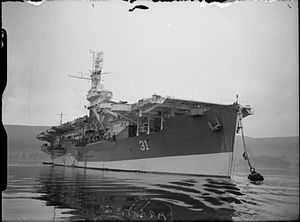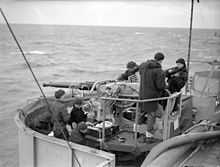HMS Arbiter (D31)
 | |
| Career (USA) | |
|---|---|
| Name: | USS St. Simon |
| Builder: | Seattle-Tacoma Shipbuilding Corporation |
| Laid down: | 26 April 1943 |
| Launched: | 9 September 1943 |
| Fate: | Transferred to Royal Navy |
| Career (UK) | |
| Name: | HMS Arbiter |
| Commissioned: | 31 December 1943 |
| Decommissioned: | 12 April 1946 |
| Fate: | Sold as merchant ship; scrapped 1972 |
| General characteristics | |
| Class and type: | Bogue class escort carrier |
| Displacement: | 9,800 tons |
| Length: | 492 ft (150 m) |
| Beam: | 69 ft 6 in (21.18 m) |
| Draught: | 26 ft 8 in (8.13 m) |
| Propulsion: | Steam turbines, 1 shaft, 8,500 shp (6.3 MW) |
| Speed: | 17 knots (31 km/h) |
| Complement: | 890 officers and men |
| Armament: | 2 × 5 in (127 mm) guns 16 × twin 40 mm Bofors 15 × single 20 mm Oerlikon |
| Aircraft carried: | 18 |
| Service record | |
|---|---|
| Part of: | British Pacific Fleet |
The USS St. Simon (CVE-51) (originally AVG-51 then later ACV-51), an escort aircraft carrier originally classified as an auxiliary aircraft carrier, was laid down on 26 April 1943 at Tacoma, Washington, by the Seattle-Tacoma Shipbuilding Corporation, under a Maritime Commission contract (MC hull 262); reclassified as an escort aircraft carrier, CVE-51, on 15 July 1943; launched on 9 September 1943; sponsored by Mrs. R. H. Lewis, the wife of Major General R. H. Lewis, Commanding General, Northwestern Sector, Fort Lewis, Washington; assigned to the Commercial Iron Works, Portland, Oregon, for the completion of construction; and delivered to the Royal Navy, under lend-lease, on 31 December 1943.
Renamed HMS Arbiter (D31) (while being carried on the United States' Naval Vessel Register with the classification BCVE-51), the escort carrier served in the Royal Navy for the duration of World War II. She earned "battle honors" in the Atlantic during 1944, serving on the western approaches to the British Isles, and in 1945 served as one of seven similar ships engaged in operating as an aircraft ferry supporting the British Pacific Fleet's train, bringing up replacement aircraft or providing combat air patrol for replenishment ships.
Returned to Norfolk, Virginia, on 23 February 1946, she was accepted by the United States Navy on 3 March 1946. Struck from the Navy list on 12 April 1946, the ship was sold to the Newport News Shipbuilding and Dry Dock Company, Newport News, Virginia, on 30 January 1947. Converted to the cargo ship Coracero, the former escort carrier served under two more names, President Macapagal from 1965 to 1972 and Lucky Two in 1972 before she was scrapped in Kaohsiung, Taiwan, in 1972.
Design and description
These ships were larger and had a greater aircraft capacity than all the preceding American-built escort carriers. They were also all laid down as escort carriers and not converted merchant ships.[1] All the ships had a complement of 646 men and an overall length of 492 feet 3 inches (150.0 m), a beam of 69 feet 6 inches (21.2 m) and a draught of 25 ft 6 in (7.8 m).[1] Propulsion was provided by a steam turbine having two boilers, connected to one shaft giving 9,350 brake horsepower (SHP), which could propel the ship at 16.5 knots (30.6 km/h; 19.0 mph).[2]
Aircraft facilities were a small combined bridge/flight control on the starboard side, two aircraft elevators 43 feet (13.1 m) by 34 feet (10.4 m) in size, one aircraft catapult and nine arrestor wires.[1] Aircraft could be housed in the 260 feet (79.2 m) by 62 feet (18.9 m) hangar below the flight deck.[1] Armament comprised: two 4 inch Dual Purpose guns in single mounts, sixteen 40 mm Bofors anti-aircraft guns in twin mounts and twenty 20 mm Oerlikon anti-aircraft cannon in single mounts.[1] They had a maximum aircraft capacity of twenty-four aircraft which could be a mixture of Grumman Martlet, Vought F4U Corsair or Hawker Sea Hurricane fighter aircraft and Fairey Swordfish or Grumman Avenger anti-submarine aircraft.[1]

Notes
References
- Cocker, Maurice (2008). Aircraft-Carrying Ships of the Royal Navy. Stroud, Gloucestershire: The History Press. ISBN 978-0-7524-4633-2.
| Wikimedia Commons has media related to Arbiter (ship, 1943). |
| ||||||||||||||||||||